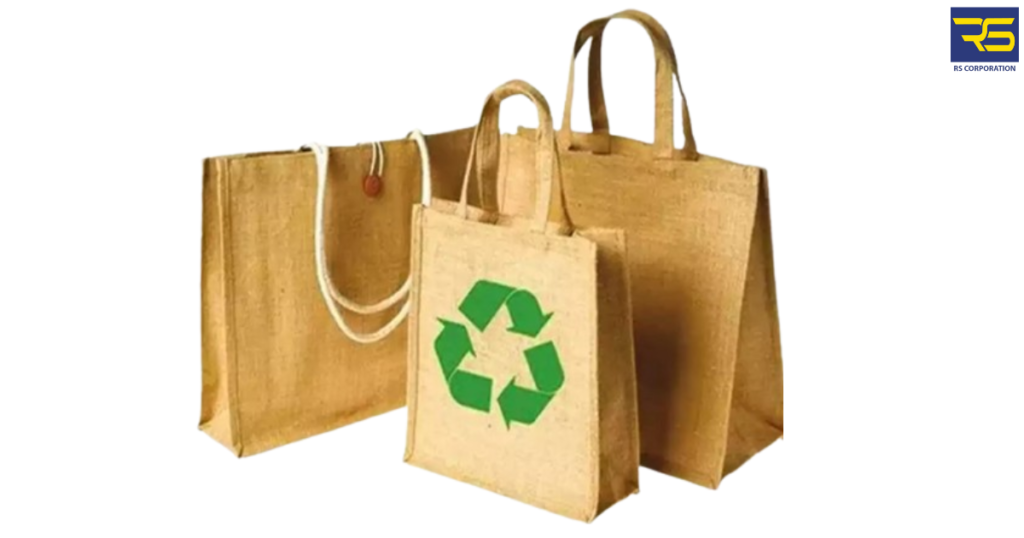Bangladesh uses jute bags, often called hessian bags, extensively since the nation produces a large amount of jute. Regarding the influence on the environment, jute bags are a desirable substitute for plastic bags because jute is a natural fabric that is renewable, biodegradable, and environmentally benign. Bangladesh is assessable based on several variables-
Bangladesh uses jute bags, often called hessian bags, extensively since the nation produces a large amount of jute. Regarding the influence on the environment, jute bags are a desirable substitute for plastic bags because jute is a natural fabric that is renewable, biodegradable, and environmentally benign. In Bangladesh, there are a lot of jute bag manufacturers. Crop rotation systems can benefit from the addition of jute cultivation, which can disrupt the cycles of pests and diseases and increase crop yields overall.
By offering shelter to a variety of creatures and fostering ecological balance in agricultural settings, jute cultivation encourages biodiversity.
Benefits of jute bags over plastic bags in terms of environmental impact
Biodegradability: Jute bags’ biodegradable nature is one of its main benefits. Compared to non-biodegradable plastic bags, jute bags naturally degrade when disposed of properly, lowering environmental pollution. jute plant are renewable and biodegradable, they are an environmentally responsible choice for a variety of items. Sustainable fashion of jute bags are durable and strong. A beach bags may fit all of your necessities, such as drinks, snacks, sunscreen, towels, and sunscreen, for a day at the beach.
Renewability: Since jute is produced from a plant that grows more swiftly than trees used to make paper or other goods, it is a renewable resource. Canvas tote bags are therefore a sustainable choice, especially in a country. Being readily renewable and biodegradable, jute fabric promotes sustainability and friendliness towards the environment. Given their cheap cost per impression, promotional bag are an affordable means of achieving long-term brand exposure.
Resource Consumption: Although biodegradable and renewable, jute wine bag still require energy, land, and water to produce. Jute bags, however, have a generally smaller environmental impact in terms of resource usage when compared to plastic bags. Single use plastic bag are lightweight and portable, making them a great option for carrying groceries and other items.
Chemical Usage: If not handled correctly, chemicals used in the production and processing of jute may hurt the environment. If not used carefully, fertilizers and pesticides used in jute farming could contaminate the land and water. Reusable bag are less likely to shatter and leak their contents since they are stronger and more resilient than plastic bags.
Waste Management: To reduce the environmental impact of jute bags, proper disposal and recycling facilities are necessary. In Bangladesh, where certain regions may lack adequate infrastructure for managing waste, it is imperative to guarantee appropriate disposal and encourage recycling endeavors.
Social Impact: It’s important to remember that many people in Bangladesh depend on the jute sector for their livelihoods, especially in the country’s rural areas where jute processing and farming are common. Encouragement of the jute sector can benefit local economies and create jobs, which has a beneficial social impact. Because natural fiber biodegrade, they are better for the environment and cause less pollution.
Jute gift bag are a favorite choice for environmentally aware customers and companies looking to reduce their environmental impact and promote a cleaner, healthier earth due to their obvious advantages over plastic bags. Canvas bag are adaptable and useful for a variety of tasks, including carrying daily necessities and traveling or shopping. Jute Lunch bags made of jute are strong and resilient, offering a dependable choice for regular usage. A broad spectrum of people can purchase jute products since they are reasonably priced when compared to other natural fibers. Jute products are moisture-resistant and breathable, they can be used in a range of climates and situations.
How jute bag production and usage is reducing pollution in Bangladesh
In Bangladesh, jute bag manufacture and use contribute significantly to environmental sustainability and pollution reduction. Bangladesh is leading the way in reducing pollution and protecting its natural resources for future generations by switching from plastic bags to more environmentally friendly options like jute bags. The cotton bag is a comfortable and environmentally responsible option for carrying goods because of its smooth texture. Jute shopping bag are sustainable and environmentally beneficial substitutes for plastic bags, contributing to the decrease of plastic pollution and the preservation of the environment.
Less Litter: Compared to plastic bags, jute bags are less likely to end up in the litter bin. Because plastic bags are frequently disposed of incorrectly, streets, waterways, and natural areas become littered. Because jute bags decompose naturally, there’s less chance that they’ll gather as litter and cause visual pollution.
Preventing Pollution in Waterways: Plastic bags are a big source of water pollution, particularly in nations with large river systems like Bangladesh. Plastic bags can damage aquatic life, clog waterways, and release dangerous chemicals into the water. When disposed of inappropriately, jute bags do not present the same threat to aquatic habitats. Paper bags are excellent for advertising businesses or events since they are adaptable and can be personalized with a variety of designs, logos, or branding.
Diminished Power Requirement: The production of eco friendly jute bags generally demands less power in comparison to that of plastic bags. Jute bag production mostly uses conventional manufacturing techniques and renewable resources, but the plastic bag manufacturing process involves energy-intensive procedures like extrusion and polymerization. Cotton bags are a sustainable substitute for single-use plastic bags that lessen plastic pollution and safeguard wildlife.
Sequestration of Carbon: As a carbon sink, jute farming aids in the sequestration of atmospheric carbon dioxide. As a result, the amount of greenhouse gases in the atmosphere is decreased, slowing down climate change. Jute plant have a high carbon sequestration potential, which helps to reduce climate change by absorbing CO2 from the atmosphere.
Sustainable Livelihoods: The Bangladeshi jute sector employs millions of people, especially in rural areas where jute processing and farming are common. Bangladesh promotes sustainable livelihoods that aid in the alleviation of poverty and economic growth by endorsing the jute industry and encouraging the use of jute tote bag
Challenges and limitations in implementing jute bags as a sustainable solution in Bangladesh
Cotton bag could be a sustainable option in Bangladesh and have many positive environmental effects.
Cost: The production of jute bags is typically more expensive than that of plastic bags. This may discourage companies and customers from switching to jute bags from plastic, especially those with tight budgets. Jute tote bags require little upkeep and are simple to clean; all that’s needed is a quick wipe down with a moist cloth or mild hand washing when necessary.
Perception and Preference: Due to their affordability, affordability, and ease of use, plastic bags are both widely used and favored by many consumers. It might take extensive education and awareness campaigns to persuade consumers to use jute bags by highlighting the benefits to the environment and motivating behavior change. Jute plant are low-maintenance crops that require less fertilizer and pesticides, lowering the environmental effect of production.
Infrastructure and Supply Chain: Compared to plastic bags, the production and distribution infrastructure for jute canvas bags might not be as advanced or effective. Restrictions on access to jute processing facilities, transportation difficulties, and inefficiencies in the supply chain might impede the accessibility and availability of jute bags in isolated or rural regions.
Performance and Durability: Jute fiber bags are more environmentally friendly and biodegradable than plastic bags, but they might not be as strong or waterproof. This may have an impact on how useful they are, especially in settings where bags are exposed to dampness or heavy loads. Juco bags are useful and elegant accessories because they frequently come in chic patterns and hues.
Awareness and Education: Many consumers may be unaware of the advantages of utilizing jute bags or the effects plastic bags have on the environment. To encourage adoption, it is crucial to raise public awareness and educate people about the benefits of jute bags and the significance of minimizing plastic waste.
Conclusion
jute bags as a sustainable solution in Bangladesh, it will be necessary to coordinate efforts by the government, business community, civil society, and consumers to overcome these obstacles and restrictions. The jute bag industry boosts the country’s economy by creating jobs and supporting the local community by jute bags in Bangladesh. To remove obstacles and promote change, this may need a mix of stakeholder collaboration, infrastructure, and technology investments. legislative interventions, and awareness-raising initial.



